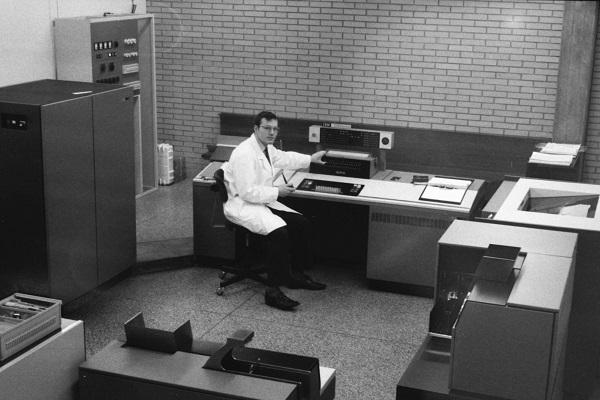For 50 years now, students in Austria have been able to select Computer Science as a major. More precisely: at the JKU. Jörg Mühlbacher was one of the very first students.

Question: You are one of the "program pioneers". What led you to computer science?
Jörg Mühlbacher: During my studies (mathematics) at the University of Vienna, I attended programming lectures (ALGOL60) at the TU Vienna simply because it sounded interesting and I was interested in innovation. I later learned FORTRAN as part of a summer internship (1967) and later worked on the same computer that the University of Linz got (IBM1130). Everything I learned was ideal for my dissertation in the field of algorithmic graph theory. After earning a doctorate at the University of Vienna (1969) I became an assistant professor in Linz in 1971 under Prof. Schulz. Prof. Schulz strongly supported my academic ambitions and I earned a post-doctorate degree in 1973. During that same year, I was appointed as an H3 professor to the University of Dortmund where I learned about other areas of computer science that were not taught in Linz, such as complexity theory, automata theory, etc.
Question: What expectations were involved in the Computer Science program?
Jörg Mühlbacher: At the time, the University of Social Sciences was still young and the Faculty of Engineering & Natural Sciences (TNF) was a newly established institution. We believed studies in computer science would not only educate students for new, future-oriented jobs, but would also enhance the TN’s image in Linz as Linz is synonymous for innovation! In addition, key players in Germany pointed out the need for these types of "specialists". However, at the time there was much discussion pertaining to the new program’s direction and focus. Back then, we spoke about "hyphenated computer science studies", such as Business-Informatics, Computer Science-Engineering (Computer Sciences), Educational-Informatics, etc., as we also wanted to distinguish ourselves from other German-language programs in Darmstadt, Munich, Karlsruhe, etc., and later also the TU Vienna. As an educated electrical engineer, Prof Schulz took an engineering approach (comparable to a software engineer). Initially, the program’s focus was pragmatically shaped by the available supply of skilled professionals, such as Prof. Lansky’s area of educational informatics (Prof. Lansky had fled Prague in 1968), Prof. Mertens’ business subjects, and then later by Prof. Reichl. Prof. Reichl was still working at IBM at the time but was appointed to the university later.
Question: How did your professional / academic career develop?
Jörg Mühlbacher: It was fairly conventional (see above): I studied mathematics between 1964-1969, programming and computer architecture at the TU, worked as an assistant professor in Linz between 1969-1973, served as a professor at the University of Dortmund between 1973-1976, and spent SS1976 as a research fellow at the University of Bristol. Starting in December 1976, I became ‘o.Prof.’ in Linz, was offered a position at the University of Zurich in 1981 which I turned down in order to remain in Linz, and then I created the Research Institute for Microprocessor Technology at the JKU. I was a guest professor in Zurich, at the HS St. Gallen (Switzerland), the University of Granada (Spain), was a co-editor of "Computermonographien im C.Hanser Verlag München", and the co-founder of the annual conference series "Workshop "Graphentheoretische Anwendungen WGxx" (WG77 in Linz) held to this today, collaborator introducing "Informatik Lehramt", continual education seminars for educators at the pedagogical institutes), have written a number textbooks (author, co-author) such as graph theory for computer scientists, data structures, programming in Modula2, Oberon, microprocessor software, operating systems. I retired professor emeritus in 2012.
Question: What do you believe to be the biggest innovation in the field of information technology over the past 50 years?
Jörg Mühlbacher: It's hard to choose because computer science is constantly being shaped by major innovations. I advocate the "invention and dissemination of the microprocessor" (INTEL 4004, 1971). The microprocessor is/was the prerequisite to decentralize computer systems, PCs, and networking - every router has microprocessors – which is a prerequisite for the Internet. As far as software is concerned, it is and was the reason to become less dependent on hardware, manifested by higher programming languages and virtual machines.
Question: Looking back, what would you have thought to be impossible at the time?
Jörg Mühlbacher: I can only say what I underestimated: the exponential growth of IT in all areas of people's lives.
Question: As head of the study commission, you introduced an "Ethics" class. Why?
Jörg Mühlbacher: I hold a Dr.phil. and not a Dr.techn. title so during my studies at the University of Vienna, the third oral defense subject was philosophy. That left a lasting impression. At the Department of Computer Science at the University of Dortmund, I led a working group titled "Social Implications of Computer Science", which I also created as part of ÖGI in Austria. It was clear to me that computer scientists need to think about the effects and impact of the technology they are developing. This also requires base-knowledge and more awareness that progress should also be subject to ethical evaluation. We find these practices in medicine today (ethics commission) and the same should apply to computer sciences. Developments in Artificial Intelligence have proven me right because the question of whether or not - and starting at what point - "AI systems" will become superior to humans should something we humans should be thinking deeply about!
Question: Half a century later, there is a new generation of pioneers at the Johannes Kepler University Linz launching the "Artificial Intelligence" program. The program is unique in Europe - what advice do you have for students?
Jörg Mühlbacher: Much is still in flux and no curriculum from the start is final! Rapid developments are to be understood as an incentive and take advantage of ERASMUS exchange programs - be an ambassador representing an innovative Faculty of Engineering & Natural Sciences!








